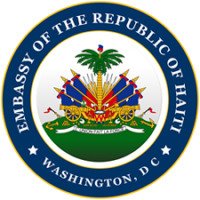
Haiti Assumes Leadership of the CBTPA Renewal for The
Caribbean Region, Promoting Free Trade in the Americas
The Government of Haiti leads the advocacy for the 10-year renewal of the Caribbean Basin Trade Partnership Act (CBTPA), for the first time in history, reiterating the legislation’s significance in promoting free trade in the Americas, strengthening bilateral relations, and advancing economic progress in the Western Hemisphere. The bill was renewed once back in 2010 and is set to expire on Sept 30, 2020.
Friday, Sept 11, 2020
On September 10, 2020, Haitian Ambassador Herve Denis addressed the House Committee on Ways and Means, chaired by Congressman Earl Blumenauer (OR-D) and Ranking Member, Vern Buchanan (FL-R) at a hearing on the importance of renewing the Caribbean Basin Trade Partnership Act (CBTPA), a critical legislation set to expire later this month (September 30, 2020).
The Chairman launched the hearing with a tribute to Haiti’s contributions in the Americas:
“The U.S. has a shared history and close ties with the Caribbean region. About 13 million Americans have Caribbean ancestry and represent about 4% of the population. Haiti, in particular, played a critical role in the American Revolutionary War when hundreds of Haitians fought for America’s independence, and years later, Haiti would defeat the French and become the first black republic influencing the rise of abolitionists and anti-colonial movement all over the world.” – Congressman Earl Blumenauer.
Why is the passage/renewal of this legislation important? Haiti’s garment industry is the industrial foundation of the country’s economy, and its existence depends on the preferences granted under CBTPA and the additional HOPE/HELP programs. The Association of Industries of Haiti (ADIH), which provided direct employment to almost 60,000 workers early this year, was already beginning to suffer from the delay in CBTPA’s renewal before the coronavirus outbreak, and even more during the global pandemic.
Buyers and investors continue to be hesitant to make new commitments while the program’s future remained uncertain. According to the Association, the future of Haiti’s garment industry, and thus the jobs and economic sustainability for many Haitian families, remains in jeopardy each day that CBTPA’s renewal goes unassured. “Failure to pass H.R. 991 would also economically impact other Caribbean beneficiaries as well as the U.S. cotton industry.” Says Ambassador Herve Denis. For almost two years, the Government of Haiti has been working with CARICOM Ambassadors, ADIH, U.S. manufacturing companies, and other stakeholders to lobby congress for the passage of this critical bipartisan piece of this legislation.
The trade programs known collectively as the Caribbean Basin Initiative (CBI) remain important elements of U.S. economic relations with our neighbors in the Caribbean. The CBI is intended to facilitate the development of stable Caribbean Basin economies by providing beneficiary countries with duty-free access to the U.S. market for most goods. CBTPA imports mostly include hydrocarbons and textiles. However, almost 270 non-textile tariff items are eligible, including footwear, tuna, leather goods, travel goods, watches and watch parts. The CBI was launched in 1983 through the Caribbean Basin Economic Recovery Act (CBERA) and expanded in 2000 by the CBTPA and again by the in the Trade Act of 2002. CBERA was implemented on Jan 1, 1984 and has no set expiration date. There are 17 CBERA beneficiary countries, eight of which are CBTPA beneficiaries. These countries include Barbados, Belize, Curacao, Guyana, Haiti, Jamaica, Saint Lucia, and Trinidad and Tobago.
Further amendments that have been made to CBERA include: the Haitian Hemispheric Opportunity through Partnership Encouragement Act of 2006 (HOPE), the Haitian Hemispheric Opportunity through Partnership Encouragement Act of 2008 (HOPE II), and the Haiti Economic Lift Program of 2010 (HELP). HOPE established special new rules of origin that make Haiti eligible for new trade benefits for apparel imports, and that enhance sourcing flexibility for apparel producers in Haiti. HOPE II modified the existing trade preference programs under HOPE, and HELP provided duty-free treatment for additional textile and apparel products from Haiti. These preferences are scheduled to expire on Sept 30, 2025.
Other participants from the private sector in Haiti, Nongovernmental Organizations (NGOs), academia, and U.S. manufacturing companies also joined the hearing to provide additional perspectives. Amongst them were Georges Sassine, Association of Industries of Haiti (ADIH), Lauren Stewart, Regional Program Director, Latin America and the Caribbean, Ms. Beth Baltzan, Principal, American Phoenix Trade Advisory Services PLLC, and Mr. Jerry Cook, Vice President, Government and Trade Relations, Hanesbrands, Inc.
The hearing was held to provide stakeholders with a platform to further discuss the domestic and foreign policy implications of CBTPA, plans to confirm the votes on the House floor before the Sept 30 deadline.
In case you missed the hearing, you can watch it here.
